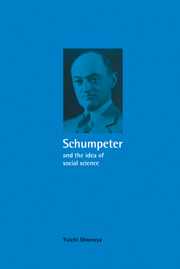Book contents
- Frontmatter
- Contents
- List of figures
- Preface
- 1 Introduction
- 2 Schumpeter and his surroundings: an overview
- 3 The scope and methods of Schumpeter's research program
- 4 The sociology of science and Schumpeter's ideology
- 5 The economic methodology of instrumentalism
- 6 Static economics as an exact science
- 7 The theory of economic development as a midpoint
- 8 A methodology of economic sociology
- 9 Economic sociology as an evolutionary science
- 10 The historical world of economics
- 11 Value judgments and political economy
- 12 Conclusion: Schumpeterian synthesis
- Notes
- List of references
- Index
5 - The economic methodology of instrumentalism
Published online by Cambridge University Press: 18 September 2009
- Frontmatter
- Contents
- List of figures
- Preface
- 1 Introduction
- 2 Schumpeter and his surroundings: an overview
- 3 The scope and methods of Schumpeter's research program
- 4 The sociology of science and Schumpeter's ideology
- 5 The economic methodology of instrumentalism
- 6 Static economics as an exact science
- 7 The theory of economic development as a midpoint
- 8 A methodology of economic sociology
- 9 Economic sociology as an evolutionary science
- 10 The historical world of economics
- 11 Value judgments and political economy
- 12 Conclusion: Schumpeterian synthesis
- Notes
- List of references
- Index
Summary
Schumpeter's first book, Das Wesen und der Hauptinhalt der theoretischen Nationalökonomie, published in 1908 when he was twenty-five, was one of the earliest attempts to give neoclassical economics a methodological foundation. His approach was influenced by the precursors of logical positivism, such as Ernst Mach, Henri Poincaré, and Pierre Duhem. In a historical survey of nineteenth-century positivism David Oldroyd observes:
Between them [logical positivists] and Comte we have a number of moderately distinct schools or “isms,” such as pragmatism, conventionalism and instrumentalism, which may nonetheless be classified more or less satisfactorily as different manifestations of positivism.
(Oldroyd 1986, 168)It was these “isms” that influenced Schumpeter's economic methodology. My argument in this chapter is that Schumpeter's methodology in Wesen can best be interpreted as instrumentalism, that is, the view that theories are not descriptions but instruments for deriving useful results and are neither true nor false. Instrumentalism is the opposite of scientific realism, which asserts that the object of science exists; theory describes it, and therefore it is possible to ask whether a theory is true or false.
A lacuna in the history of economic methodology
Schumpeter's contribution to economic methodology has not received the attention it deserves. There are several reasons for this.
- Type
- Chapter
- Information
- Schumpeter and the Idea of Social ScienceA Metatheoretical Study, pp. 91 - 123Publisher: Cambridge University PressPrint publication year: 1997



